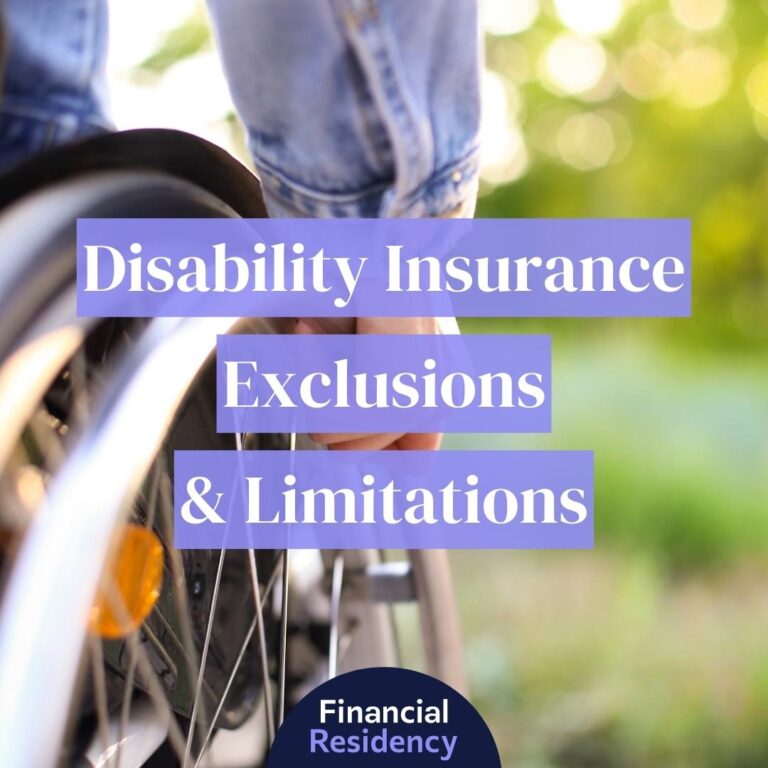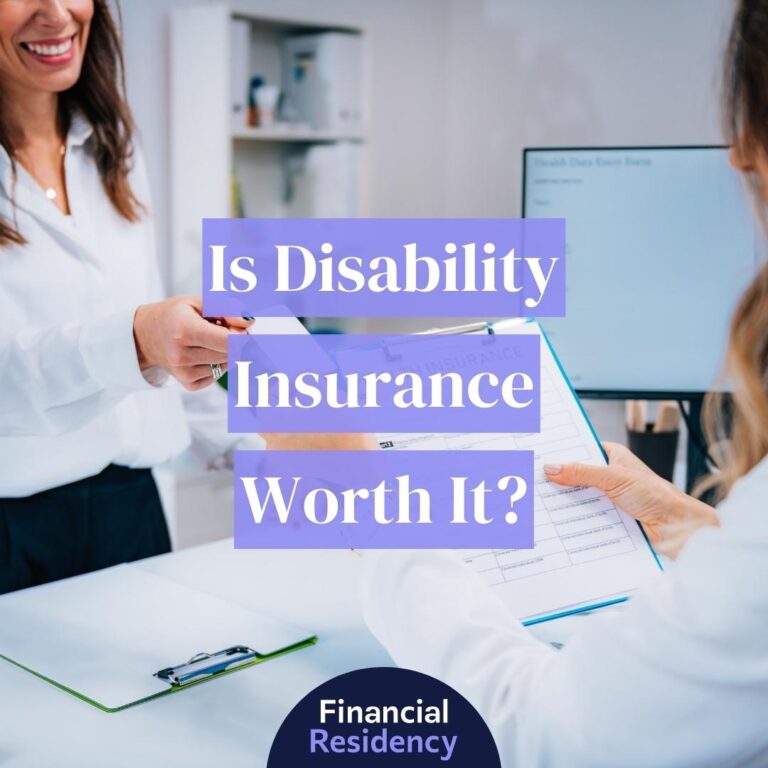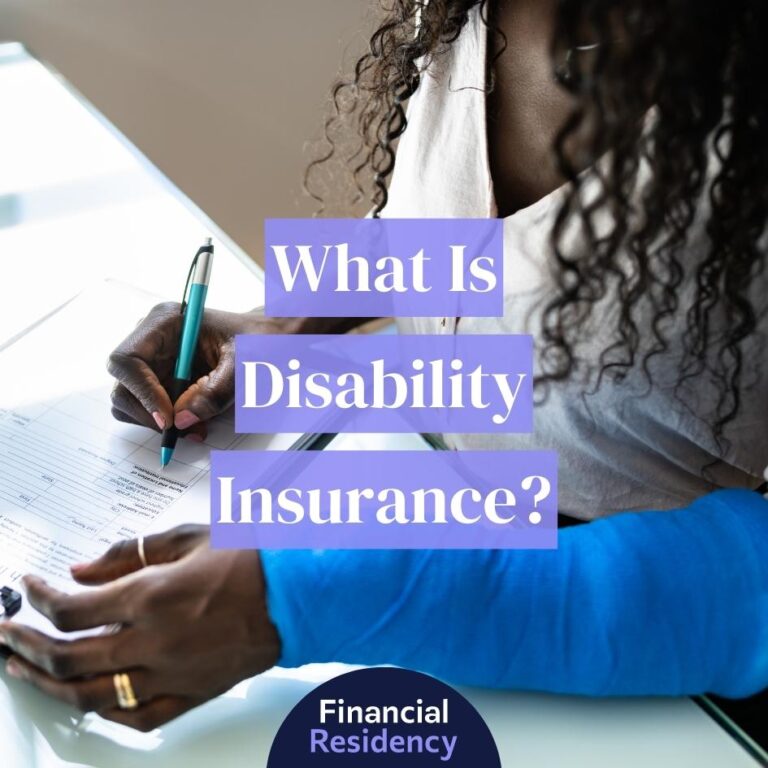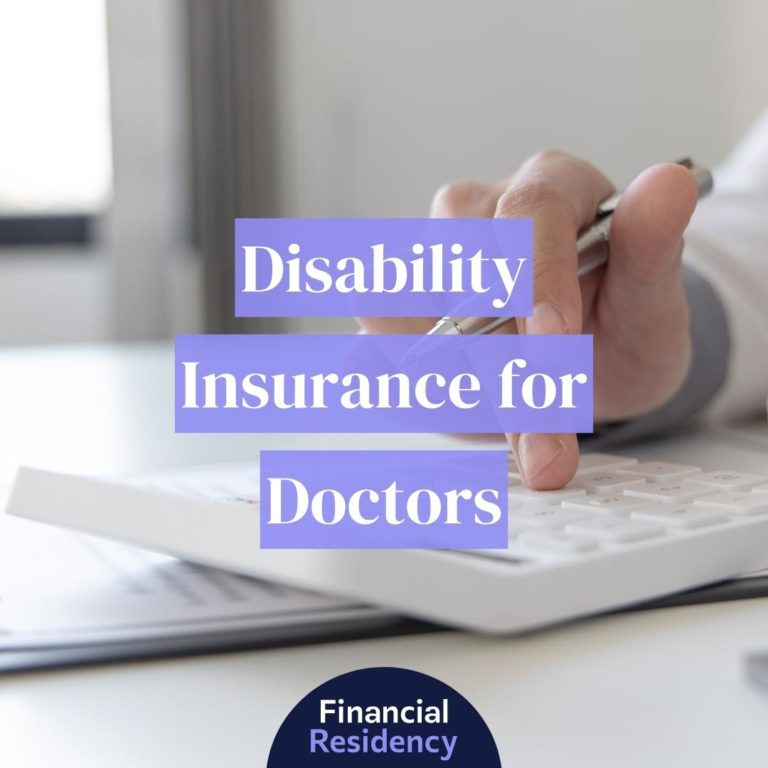Dentists like you work hard and earn a great income because of it, but what happens if you become disabled? Without the ability to work, you can’t get paid, and then how would your family live?
Disability insurance for dentists ensures you have the coverage you need to handle your daily cost of living and maintain your lifestyle while you get your life back on track.
Here’s everything you should know about disability insurance for dentists.
Dentist Disability Insurance: Why You Need It
You might think you aren’t at risk of a disability; after all, you’re a dentist and aren’t doing any heavy lifting.
But did you know each year, 5% of working Americans experience at least a short-term disability, making them unable to work for up to one year?
Imagine being unable to work for that long. That means no pay for up to a year. How would you survive?
Debt
The most significant consideration when a dentist cannot work is their debt. The average dental school graduate has $293,000 in school loans. If you aren’t working, how would you keep up with the debt payments, and that’s just school loans?
You must also consider other loans, such as a mortgage or rent, credit cards, and personal or auto loans.
Maintain Lifestyle
Dentists make an average of $169,139 to $212,510 per year, and most live up to their income, meaning they live a more luxurious lifestyle than the average person.
If you want to maintain your lifestyle while being unable to work, you need something to replenish the income you aren’t earning.
Disability insurance can pay a percentage of your income. Of course, you won’t receive 100% replacement, but even 60% to 70% can help you in most areas, and if you have a group disability policy or money saved, you can supplement the insurance and live life like you’re used to.
Disability Risk for Dentists
Being a dentist is probably not a ‘risky’ occupation. But there are specific disability factors dentists face.
Dentists commonly face degenerative diseases because of how much walking, bending, and twisting they do. Dentists are also at risk for musculoskeletal issues from gripping and grasping, making their hands less than optimal for the dentistry industry.
High-stress levels also increase dentists’ risk for cardiovascular diseases and mental health issues.
Dentist Disability Insurance Eligibility Factors
When buying dentist disability insurance, you must consider eligibility factors like any other insurance policy.
THE FACTORS INCLUDE:
- Income: How much you make monthly determines how much coverage you can get. You won’t find a policy that provides 100% coverage, but the closest you can get to replace your income, the better. Some dentists have to layer policies, such as an employer-sponsored policy, with an individual policy, but be careful. Most policies have a maximum limit you can receive from all policies combined.
- Age: The younger you are, the easier time you’ll have to get disability insurance. Like health or life insurance, the younger you are, the less risk you pose of filing a claim. While disability affects everyone, you’re likely in better health and have a lower risk of a health-related disability.
- Health: Insurance companies will assess your health, determining your risk factors for things like cardiovascular disease or other illnesses that could render you unable to work. The better your health, the easier time you’ll have getting approved for disability insurance.
- Lifestyle: Your lifestyle determines how much of your income you must replace. For example, you’ll need as much coverage as possible if you plan to continue living an extravagant lifestyle.
Considerations when Choosing a Policy
When choosing a disability insurance policy for dentists, you have many options. Here’s what you should consider.
1. Policy Type
When choosing a policy, you can choose between short and long-term, plus employer-sponsored vs. individual.
Group Disability
Group disability policies are employer-sponsored. Some employers pay the premiums, and others only supplement them. Either way, the policy usually doesn’t require underwriting; as long as you meet the employer’s requirements, such as working for a certain number of days and hours, you qualify.
The downside of group disability policies is you will likely have limited benefits, and if you leave your job, you usually lose the disability coverage. The only exception is if you secure disability coverage from the ADA; this coverage isn’t tied to one specific employer.
Individual Disability
Individual disability insurance is an excellent way to supplement any group policies you have. You can buy a policy to cover the difference in what your group policy doesn’t cover to ensure you have enough coverage if you’re disabled.
Unlike group disability policies, you must undergo underwriting, and there may be exclusions if you have any pre-existing conditions.
Individual policies usually have longer elimination periods as well. This is the time after you file an approved claim that you don’t receive payment. For example, a 30-day elimination period means you don’t receive compensation for the first 30 days of a covered claim.
Short-Term Vs. Long-Term Policy
You’ll have the option of short and long-term disability policies too. Short-term policies cover disabilities for one year or less, and long-term cover you through retirement, usually until age 65 to 67, but it varies by policy.
Short-term policies are good for those who don’t have much money saved and would be in financial ruin if they became disabled.
Long-term policies are good for everyone because it protects your income for the long term. For example, if you became disabled at age 30 and could no longer work, you’d need coverage for the next 37 years until you could receive Social Security and tap into your retirement savings.
2. Occupation Class
Insurance companies rate the risk of someone working a specific occupation class becoming disabled. Dentists typically place in the middle, meaning they don’t get the highest or lowest premiums. However, dental specialists are sometimes ranked higher (riskier).
Look at how an insurance company ranks dentists to determine the premium you’ll pay. Unfortunately, no two insurance companies have the same ranks.
3. Reputation
Like any insurance policy, be sure you know the insurance company’s reputation. Check their financial strength, and read reviews about their payout procedure.
You don’t want to work with a company that struggles to make payouts or that makes filing a disability claim stressful. It’s stressful enough to suffer a disability; the last thing you want is trouble getting your payout.
4. Features
Like most insurance policies, no two disability policies are the same. Understand the features and how they affect your ability to receive payment. Here are the most common features to consider.
- Elimination Period: The elimination period is the time you must cover your costs and be without a payout. It’s like the equivalent of a deductible in health insurance. You can choose an elimination period between 30 to 365 days. The longer the elimination period, the less in premiums you’ll pay, but never choose an elimination period you can’t afford.
- Benefit Period: The benefit period is how long you can receive benefits. For example, some policies offer benefits for 2, 5, or 10 years, while others provide benefits through age 65 to 67. The plans with longer benefit periods have higher premiums.
- Future Increase: If you purchase disability insurance early in your career, your income will likely increase. A future increase rider enables you to increase coverage without going through underwriting again.
- Non-Cancelable: A non-cancelable policy means the insurance company cannot cancel the policy for any reason. They also cannot raise your premiums even if costs increase.
5. Riders
Adding riders to your disability policy is a great way to personalize it and ensure you have the necessary coverage.
- COLA: A COLA rider ensures your disability benefits keep pace with inflation. If the cost of living increases significantly, your payout benefits will increase accordingly.
- Own-Occupation: Own-occupation coverage is the broadest coverage and ensures a payout if you cannot perform your duties as a dentist. Without it, you might not get coverage if you become disabled, but you can perform other jobs, even those for lesser pay.
- Student Loan: If you have a lot of student loan debt, you can purchase a rider that will pay an extra benefit explicitly meant to pay your student loans. While you could use your general benefits to pay your student loans, this rider can ensure you still have enough for other expenses if you have a lot of student debt.
- Partial Disability: If you can return to work part-time or with limited duties, you might get residual benefits or benefits that make up the difference between your pre-disability income and what you make after becoming disabled.
- Catastrophic Disability: If you have a catastrophic disability occur, and you cannot work or function independently, you may receive a higher payout to cover the cost of care.
6. Cost
Disability insurance costs 1% to 3% of your annual salary with most companies. However, the actual costs vary based on age, health, riders, occupation, and benefit amount.
For example, two dentists in the same area with the same benefit amount may pay two different premiums depending on their health and riders. For example, one dentist may choose a COLA and student loan rider, while the other might choose own-occupation and partial disability. Therefore, each would have different premiums.
5 Best Disability Insurance Policies for Dentists
There are a handful of disability insurance policies for dentists. Here are the most popular policies and what you can expect.
1. MassMutual
MassMutual has an A++ financial rating from A.M. Best, the highest financial rating an insurance company can have, so clients don’t have to worry about not receiving a payout.
MassMutual offers coverage up to $20,000 a month in 2, 5, and 10-year terms, as well as terms up to 65, 67, or 70 years old. In addition, they offer a range of elimination periods of 60 to 365 days and offer a variety of riders, including own-occupation, automatic increase, and residual benefits.
2. Ameritas
Ameritas is one of the insurance companies that offers ‘true disability coverage,’ protecting dentists to the highest level.
Ameritas offers disability insurance coverage up to $20,000 per month and has every rider you could think of available to add to your policy, including own-occupation, future increase, and a residual rider that begins benefits with a partial disability and only a 15% loss in income.
3. The Standard
The Standard offers disability coverage that covers your own disabilities, plus any time off you must take to help a disabled immediate family member. The Standard offers up to $20,000 in monthly coverage and has elimination periods of 30 to 365 days.
The Standard offers all the traditional riders you’d expect, plus a residual disability rider if you can return to work to a lesser degree. They also offer policies that last as long as 70 years old.
4. Principal
Principal is another great insurance company offering disability insurance for dentists. They offer many customization options, including future increases, own-occupation, and partial disability if you lose 20% of your income.
Principal’s disability insurance coverage lasts until age 70, which is longer than other policies.
5. Guardian
Guardian is the top-of-the-line disability insurance Guardian offers. One of their most stand-out benefits is the ability to receive a full payout even if you can work another job; most companies limit what you can receive if you can work.
They also have their own occupation, future increase, and student loan riders. Guardian also doesn’t limit mental illness disabilities, whereas most companies limit the coverage to two years.
FAQs
Disability insurance for dentists is essential whether you’re early in your career or already established. It’s protecting your investment in dental school.
Will Dental Disability Insurance Help Me Cover Student Loans?
You can use your disability insurance payouts however you need, but sometimes, there isn’t enough to cover student loan payments and your daily cost of living. However, some policies offer a student loan rider that pays an extra benefit to cover student loan payments temporarily.
What Are The Chances I Will Need Disability Insurance as a Dentist?
Everyone is at risk of becoming disabled, but according to the ADA, 1 in 4 dentists will become disabled and collect disability insurance at some point.
Where Can I Buy Dental Disability Insurance?
A handful of insurance companies offer disability insurance for dentists that are robust enough to cover your income. Principal, The Standard, Guardian, MassMutual, and Ameritas are all great choices.
The Bottom Line
Don’t ignore the need for disability insurance for dentists. Instead, think of it as protection of your investment in yourself in dental school. You spent a lot of money on your education; it’s time to protect that investment and ensure you can live the life you hoped.



